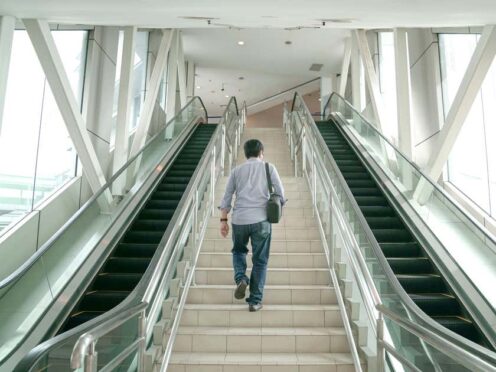
Climbing stairs instead of using the lift is associated with better heart health and a longer life, scientists say.
New research suggests regularly taking the stairs is linked to a 24% reduced risk of dying from any cause and a 39% lower likelihood of dying from heart disease.
The scientists said the findings, presented at the European Society of Cardiology’s Preventive Cardiology conference in Athens, Greece, indicate that even short bursts of activity such as stair climbing could cut the risk of premature death.
Dr Sophie Paddock, of the University of East Anglia and Norfolk and Norwich University Hospital Foundation Trust, in Norwich, said: “If you have the choice of taking the stairs or the lift, go for the stairs as it will help your heart.
“Even brief bursts of physical activity have beneficial health impacts, and short bouts of stair climbing should be an achievable target to integrate into daily routines.”
Physical inactivity is associated with one in six deaths in the UK, according a report compiled by the Office for Health Improvement and Disparities.
Evidence suggests regular exercise can reduce the risk of early death and heart disease.
The NHS recommends at least 150 minutes of moderate-intensity exercise every week.
For the study, the team looked at data from nine studies involving more than 480,000 people, aged between 35 and 84 years.
Healthy individuals as well as patients with heart disease were included in the analysis, of whom 53% were women.
In addition to reducing the risk of premature death, stair climbing was also found to be associated with a lower risk of heart disease including heart attack, heart failure and stroke.
Dr Paddock said: “Based on these results, we would encourage people to incorporate stair climbing into their day-to-day lives.
“Our study suggested that the more stairs climbed, the greater the benefits – but this needs to be confirmed.
“So, whether at work, home or elsewhere, take the stairs.”

Enjoy the convenience of having The Sunday Post delivered as a digital ePaper straight to your smartphone, tablet or computer.
Subscribe for only £5.49 a month and enjoy all the benefits of the printed paper as a digital replica.
Subscribe